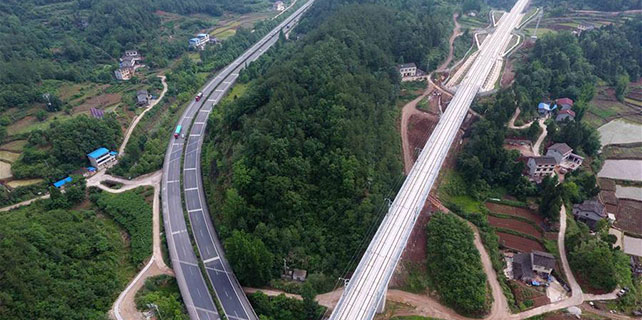Huizhou's contract bids online rock
Editor's note: In the run-up to the 19th CPC National Congress, China Daily will cover a series of reforms, showcasing huge improvements in the country's services.
Click a button and wait for 30 seconds, the computer will randomly pick the company to provide services for a government project. Then the computer operator will type the company's name on a bid-winning notice, which will pop up on the cellphone of the company's staff in a minute.
The whole process is displayed on a big screen in the municipal administrative services center of Huizhou in South China's Guangdong province, ensuring the transparency and fairness of government procurement of intermediary services for administrative approval.
Huizhou was the first location in the province to set up an online "intermediary supermarket" in 2014, in which the city government offers projects and the prices for intermediary services. Service providers can browse online and select projects when they accept the price. Then the computer will draw lots to choose the bid winner.
A fixed assets investment project, whether it is invested by the government or by companies, must go through a vetting process from project initiation to construction completion. As a result, the project needs to hire third-party organizations that can provide services such as land valuation and cost consulting to get approval from administrative organs.
In the past, some administrative organs would assign one or several agencies over a long period of time to provide services, which created a monopoly harmful to the market development, said Hu Jianbin, a standing committee member of Huizhou Municipal Party Committee.
"The online intermediary supermarket has cut off the guanxi (connections) between administrative organs and agencies, which effectively prevents corruption," Hu said.
Zhu Shushen is the business manager of the Huizhou office of the Beijing-headquartered China Urban Construction Consulting Co Ltd. He said he used to spend a lot of time and energy seeking government projects with guanxi and running between different government departments to hand in application documents.
"Now I just need to get registered at the online intermediary supermarket and sit in front of the computer to select projects to bid for," Zhu said. "And this online platform ensures fair competition by drawing lots."
Now all government projects in Huizhou that offer a price below 500,000 yuan ($73,598) for intermediary services are open for bidding from agencies across the country on the online platform, and the system randomly picks the winning bid.
Saving the labor costs required to go through every single agency's application documents, the online platform has also reduced fiscal expenditure by about 130 million yuan since it was launched three years ago, according to Huizhou government's development and reform bureau.
By the end of May, 1,614 companies and organizations had registered at Huizhou's online intermediary supermarket. Altogether 16,503 business deals have been made, with a turnover reaching 416 million yuan.
Other cities in Guangdong such as Zhongshan, Heyuan, Qingyuan, Jiangmen and Zhaoqing, as well as other provinces including Yunnan, Hebei, Shandong, Sichuan and Fujian, have learned from Huizhou and set up their own online intermediary supermarkets.
"As more and more cities adopt Huizhou's model of intermediary services management, a national network can be built in the future to keep track of agencies' credit records," said Wang Guorong, an official at Huizhou government's development and reform bureau.









